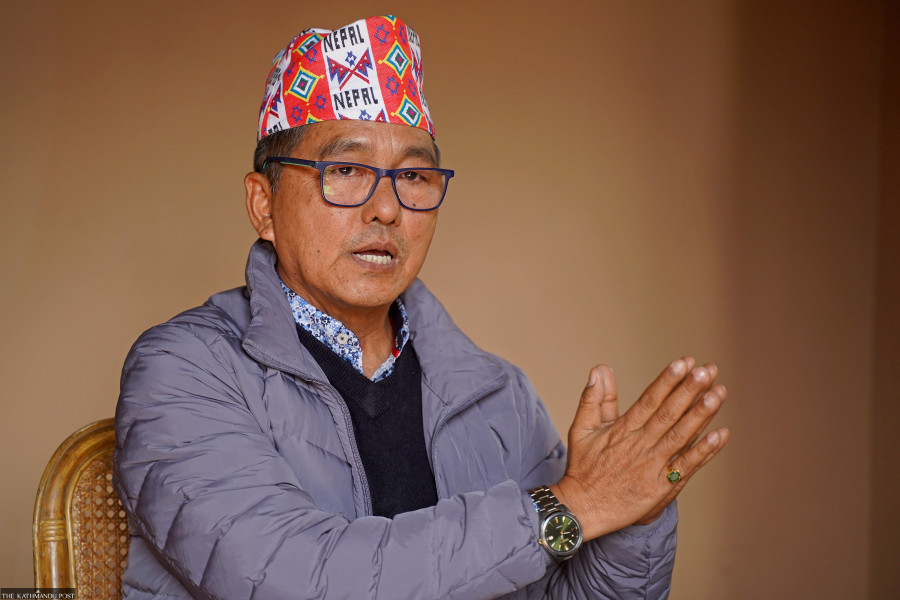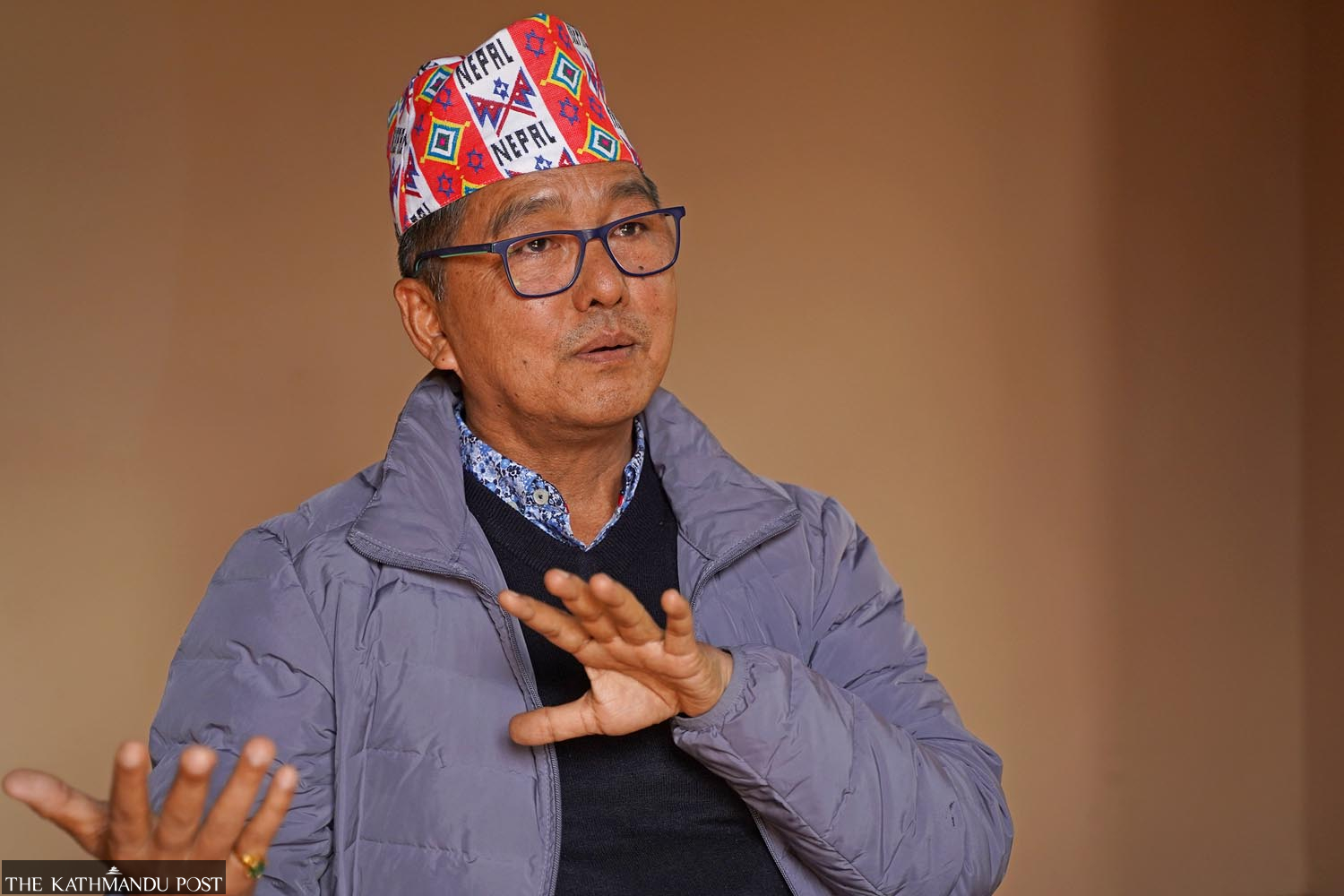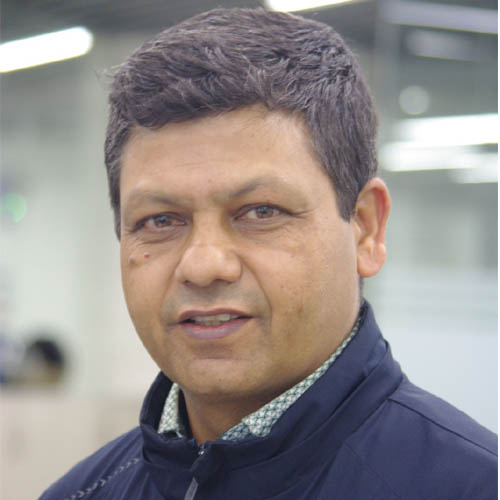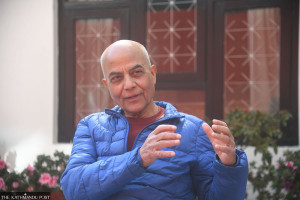Interviews
RPP for new arrangement on monarchy, not for revival of old system
Parliament could be given the power to decide the heir to the monarch, whether it will be eldest son or eldest daughter.
Thira Lal Bhusal
Pro-monarchy and pro-Hindu state forces have stepped up their activities. Rastriya Prajatantra Party (RPP), which has 14 seats in the House of Representatives, is the largest pro-monarchy force in the country. Thira Lal Bhusal of the Post sat with RPP chair Rajendra Lingden to discuss the party’s vision for a Hindu kingdom.
Your party has stepped up efforts to reinstate monarchy and Hindu state. Tell us about your roadmap.
For long, we have been saying that the present political system is unsuitable for our country. Contemporary political developments have only proved our stand. Now the general people have also understood that this system and leadership won’t work. They know that the longer we continue with this system, the more the country will lose. Therefore, all the political forces should accept the RPP’s roadmap of ‘democracy with monarchy’. The major forces that led the movement to establish the present system should admit it was a wrong political course, be ready to correct it and give space to the king. If they don’t, the RPP will take to the streets with the agenda of reinstating the monarchy and Hindu state.
What kind of agitation will that be? Is it easy to topple the current system through protests?
We will run awareness campaigns for two months starting mid-December to lay the ground for an uprising. We will organise hundreds of mass gatherings in all districts and local units. By mid-February, we will conduct a Mechi-Mahakali tour and then hold some Kathmandu-centric demonstrations. We know it won’t be easy. But we will compel them to correct their decisions.
Some other groups have raised your agenda of late. Will you join hands with them?
I believe we have some sort of collaboration. If any group or individual wants to join this movement for the cause, not for personal vested interest, they can.
You publicly criticised your party leaders and members for following a person like Durga Prasai, a bank loan defaulter. Will the RPP join hands with him too?
We can’t succeed in our mission with the support of any anarchic groups. I believe the government must address economic issues. People have suffered because of wrong policies and steps of the finance ministry, the Nepal Rastra Bank and other government agencies. Everyone from big business houses to those into small and cottage industries is in crisis. Some have gone bankrupt. Some people have even resorted to extreme steps such as self-immolation. The state must take measures to fix the economic crisis. The RPP has asked the government to lower the interest rate to a single digit, ease the loan payment system and halt the auction process for at least a year to give defaulters a chance to pay back their loans by selling properties. But we can’t accept extreme demands raised by some groups just because they have raised the issue of reinstating the monarchy.
You opposed Prasai’s anarchic activities but your chief whip Gyanendra Shahi addressed his rally.
Sometimes, in politics, you need to make such strategic moves. For now, we should take the chief whip’s involvement in the event as a coincidence as he didn’t take part as per the party’s official decision. We need to discuss this matter within the party.
Congress President Sher Bahadur Deuba recently said they might rethink secularism. Are you discussing the issue with the Congress leaders?
We aren’t formally talking to any political party in this connection. But when we meet for inter-party discussions, I try to convince them that the political course they have adopted has failed and now is the time to correct it. As far as the voices for Hindutva in major parties are concerned, for us it is a matter of happiness. But some of them aren’t raising this issue out of conviction but because they sense that this agenda is becoming popular and could be used to secure votes. The Congress still hesitates to accept Hinduism. But over time all political forces will have to accept it.
Will the political parties go back on recent progressive achievements?
We aren’t in favour of turning the clock back. We shouldn’t maintain the stalemate either. What we should do is to move ahead by making new arrangements by accommodating all the forces.
Two weeks ago, former king Gyanendra attended a mass gathering organised by the RPP. How does he observe recent activities?
The king we want to restore will not just be the king of the RPP but of every Nepali. We advocated for a King instead of the President as the latter often takes the side of a political party. A political cadre can’t be an institution nor a guardian of the country. Monarchy can be a force for stability that is above day to day politics. King Gyanendra has been making his messages public on certain occasions. He is concerned particularly about the plight of people and increasing involvement of foreign powers in Nepal for their strategic interests. You cannot expect him to comment on the restoration of monarchy. It’s up to the people. Some people have even said that he should come to the street. That is wrong. He isn’t interested in such activities.
We hear different views both from those in and outside the RPP on the modality of monarchy they want. Some are for reviving the constitution of 1990. What is your idea?
We should make new arrangements. We don’t want to go back, or to maintain the status quo. Some are for reviving the constitution of 1990. But society has come a long way since. There are many good provisions in the present constitution that weren’t there in the constitution of 1990. This statute allows one to challenge this constitution itself. The RPP has got the chance to oppose republicanism, secularism and federalism from the parliament rostrum and outside. This is the right given by the present constitution. Therefore, we can’t go back to 1990. We have to find a new system respecting the spirit of change and reflecting the present reality.

Are you for ceremonial, cultural or constitutional monarchy?
We are for a constitutional one. But when we try for a compromise deal, you may argue for a ceremonial or a cultural monarch. Our basic demand is that the king should get a space and there should be monarchy in place of the presidential system.
Why do you ask for a system that allows only the eldest son of a particular person to be head of state, even as the Nepali society has rejected the idea years ago and adopted a more progressive system?
Only those with superficial knowledge think a country without monarchy is progressive. The examples of Britain, Japan, Spain, Denmark, Thailand prove them wrong. There are many countries that have progressed impressively under monarchy while many republican countries are poor, backward and war-torn. Nepal needs a permanent institution that can play the role of a guardian, also because of its geopolitical sensitivity. The monarchy that will be reinstated should accept the new reality. Parliament will decide the heir to the monarchy. It will decide whether it will be eldest son or eldest daughter. The major political forces in the Parliament were the ones who in 2006 had amended the Act on heirs and paved the way to make the eldest child of the monarch inherit the throne, irrespective of the gender. Later, they overthrew the monarchy itself before practicing the new provision. In a similar way, we can go for a new agreement by giving power to the Parliament.
You said monarchy can be reinstated from within this constitutional framework. How is that possible?
If people trust the RPP, they can make it more powerful and we can change the system through a two-thirds majority in the Parliament. If not, we can create massive public pressure and make all sides agree to a political agreement that gives space to the monarchy and all political forces.

Don’t you think political forces such as the Congress, the UML and the Maoists will come together to defend the present system?
I agree with your assumption. When we build pressure, there will be a polarisation. Those sitting on the fence will take a side. There will be an alliance of those who defend this system, and those who want to change it will form another bloc led by the RPP. The current establishment won’t be able to stand the pressure and they will be ready for a new deal. The Congress and the UML are flexible. Until the late 1990s, they weren’t ready even to listen to the demands of the republican system. But within a decade, they readily accepted republicanism, federalism and secularism. So they will accept our demand. The recent temple visits of their leaders suggest the same.
When people in the eastern region and other parts of the country are agitating demanding more rights for provinces, your party wants to scrape these structures. Don’t you think your party is adding complications?
No, we want to overhaul the system in totality. For instance, we want to correct the wrong electoral system and the key appointment system. We aren’t against the federal system. But we want to scrap provinces and strengthen local units. The number of elected representatives should be drastically reduced, from federal to local levels. Provinces added red tape. We should establish direct relations between centre and local levels.
How can a federal system work without provinces? Your concept sounds like the decentralised model of the yore.
If people get more power at their doorsteps, why do we need provinces? We don’t need this unnecessary layer. It is not working for any marginalised or underprivileged communities either. It is only creating more privileged classes.
You claim huge support for your agenda. But why has the RPP failed to emerge as a leading electoral force? Are the party and its leaders unpopular?
It’s a valid question. The public support for our agenda has increased a lot. But the RPP has failed to grow in that ratio. We discussed the issue internally and concluded that the problem is within us. We failed to expand our organisation. At times, we were seen as power-centric. We have to correct ourselves.
Even in government, we have made important contributions. We succeeded in making the government declare the day of Prithvi Narayan Shah (Paush 27) a national holiday from the Pushpa Kamal Dahal-led Cabinet. We also proved that we can deliver as ministers, making important decisions without being corrupt.
The Bharatiya Janata Party obviously wants to establish Nepal as Hindu kingdom. How is your party’s relation with India’s ruling party?
The RPP is a homegrown party. We don’t seek any external force’s interference to establish our agenda. We welcome goodwill and for that we also hold dialogue with our wellwishers. But we constantly insist on non-interference.




 17.12°C Kathmandu
17.12°C Kathmandu



.jpg&w=200&height=120)








